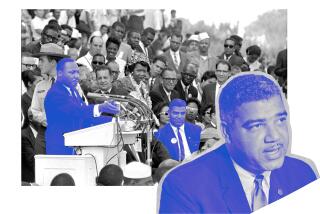Lack of Depth Weakens Guide to Moral Living
Whatever the qualms over its spiritual authenticity, the Book of Mormon offers one of the more compelling explanations for the fall of man and, thus, the existence of evil: “Adam fell that men might be; and men are, that they might have joy.”
Here we have, in one spare statement, the essence of Mormonism, which since its founding in the 1820s has attempted to reinvent American Protestantism in a way that redeems a sense of optimism from the lake of guilt and sin. And although you won’t see it put so plainly, that seems to be the thrust of “Standing for Something: 10 Neglected Virtues That Will Heal Our Hearts and Homes,” by Gordon B. Hinckley, president of the Church of Jesus Christ of Latter-day Saints.
The curious thing is how far Hinckley goes to avoid mentioning his church’s unique scriptures, beliefs or internal workings. Declaring himself a “churchman”--not the prophet, seer and revelator for 10.3 million “saints”--he offers a book that could be mistaken for a work by evangelist Billy Graham. Of some 80 verses quoted, all are from the Bible, for instance, and none from Mormon scriptures.
Which is exactly the idea. As the founding father of the church’s public relations apparatus, Hinckley knows the power of spin. His rhetoric is sanitized of any Mormon references so that it can resonate with a wider audience, including fundamentalist Christians who regard Salt Lake City as Cult Central.
Hinckley does the job. His book’s unexpected foreword by tough-guy CBS journalist Mike Wallace describes the prophet as a “remarkable man” with an “agile, thoughtful and engaging mind.” Hinckley makes no secret of his ecumenical purpose: “We have cultural and theological differences, but I believe we are of one mind in our awareness of the evils and problems of the world.”
At the root of America’s problems and evils, he says, is the secularization of society, and his prescription is a list of 10 virtues that need to be revived. They include love, forgiveness, mercy, morality, faith and honesty. He devotes a chapter to each, expounding on it as an old-fashioned yet necessary remedy. Part two of the book is dedicated to the preservation of marriage and the family, with an epilogue on the loneliness of moral leadership. There are the predictable denunciations of pornography, sexual immorality and homosexuality. He singles out the media for dispensing a “vinegar of invective and anger” and “dwelling on their subjects’ failings rather than their strengths” (listening, Mike?). He attacks Hollywood for “insipid, destructive programming.” Anyone who winced at the Ally McBeal carwash scene might agree, but the sermonizing gets tedious all the same.
Yet Hinckley isn’t just the fire-and-brimstone type. His upbeat, Zig Ziglaresque personality is amply evident, particularly in passages in which he counts his blessings and declares his love for America. It informs his Top 10 list, which also includes civility, optimism and learning. His message ultimately rings hollow, however, because the book lacks philosophical heft; it fails to engage in meaningful introspection and disclosure. Hinckley lays out cause and effect, but passes over the middle ground of personal struggle, where most of us live. Like his avoidance of the M-word, he seems unwilling to plumb his experience, position or religious viewpoint to lend a depth to his moral arguments.
He’s certainly capable of it. In one scene, Hinckley shows us the sorrow of an unmarried couple facing an unplanned pregnancy. We feel the humanity of moral decisions and his own divided feelings: “I admired their courage and their determination to make the best of a difficult situation, but my heart ached as I watched them. Here was tragedy. Here was bondage.”
One wants to know more about such personal struggles, because sometimes distinguishing right from wrong is not a black-and-white decision. One wants to know the dilemmas, but that would require knowing more about Hinckley’s world. He expresses concern for prejudice yet is strangely silent about coming to terms with his own church’s history of discriminating against blacks in the priesthood (Hinckley, in a 1998 Times story, defended his church’s equal rights opportunities but felt no need to repudiate former teachings that blacks were cursed by God).
The same reader interest applies to the idea of marriage and the nuclear family today. It is one thing to make its preservation a theological cornerstone, as in Hinckley’s church, but how to deal with the inevitable divorces among his flock? In the book, he condemns divorce as “selfishness,” but that’s not enough. It happens. The walking wounded need to salvage some joy after the nightmare. Instead, Hinckley offers Reaganisms like “right is right and wrong is wrong” in a book one wishes had gone deeper into the things for which he stands.
Ralph Frammolino is an assistant city editor in The Times’ Metro section.
More to Read
Sign up for our Book Club newsletter
Get the latest news, events and more from the Los Angeles Times Book Club, and help us get L.A. reading and talking.
You may occasionally receive promotional content from the Los Angeles Times.









